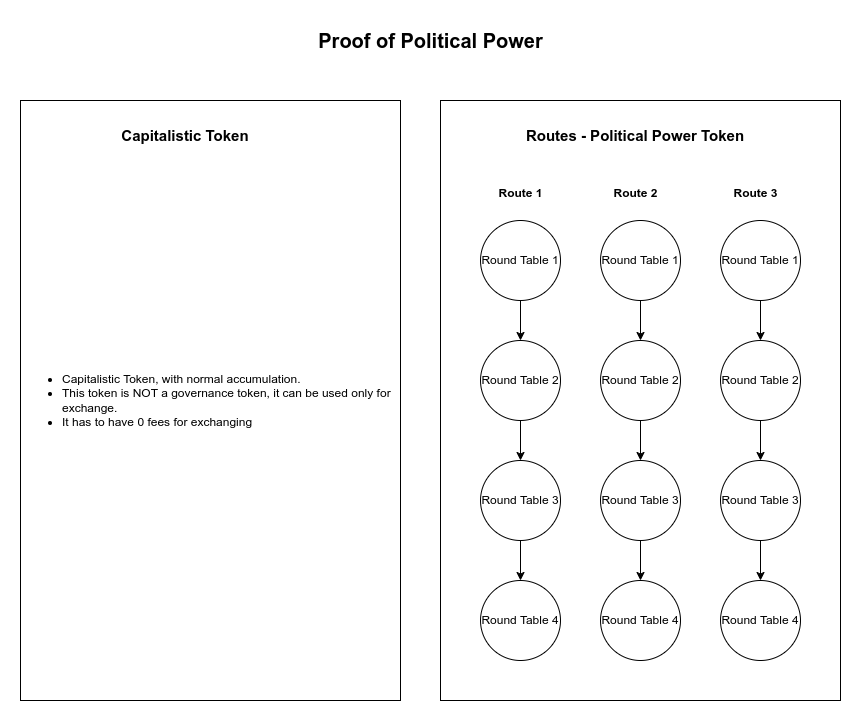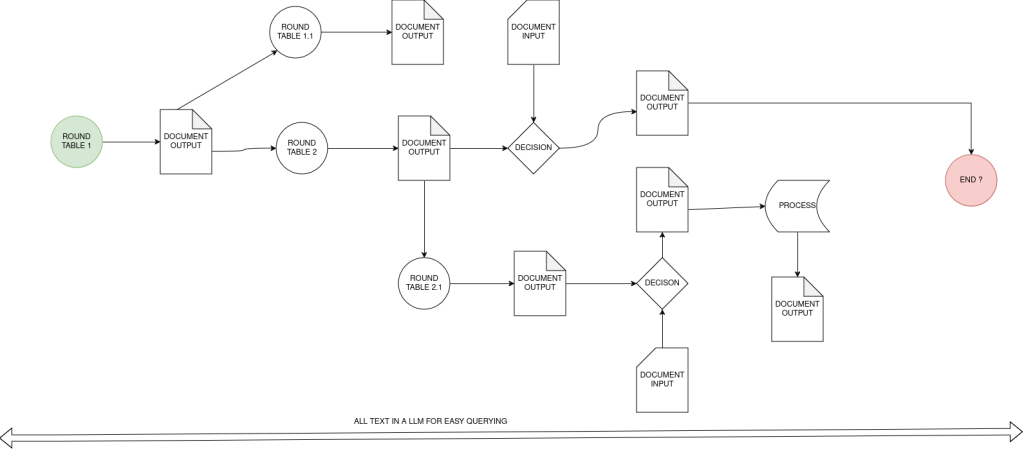Abstract
Proof of Political Power is a concept that propose to use political power of people, precisely the one “recorded” by digital deliberative systems as a token for the lottery of validation for blocks in blockchain systems. This with the intent of separating governmental and political power from other forms of power, like economic one.
Proof of Political Power
Proof of Systems often suffer from a glaring issue: they aim to incentivize decentralization but
achieve only physical decentralization, while still maintaining logical centralization tied to the
amount of money individuals possess.
Current institutions are logically centralized but are decentralized on a geographical scale. My
thesis posits that without new block validation systems, the outcome will be that everything changes
superficially, yet fundamentally remains the same.
What we need to find is a Proof of System that cannot be accumulated in any way. Currently, Proof of Work consumes energy solely to solve a mathematical problem that randomly selects a node. In the digital world, randomness doesn’t truly exist, which is why the PoW system functions effectively. No one can predict which node will resolve the mathematical puzzle, and the successful node then becomes the authority that certifies the validity of a block.
The accumulation of wealth in the physical world prevents full decentralization in the digital realm
because mining farms have a higher probability of being selected as the authoritative validator of blocks.
This reasoning also applies to Proof of Stake systems, where the link between authority and wealth is even more apparent. Every stake, every coin, acts as a lottery ticket for selection as a node that validates the block.Game theory justifies both systems: people invest money in mining hardware or tokens and thus are motivated to protect their investment. Money essentially represents time: you invest your time to earn money, which can then be used to pay someone else for their time.
How can we link power and authority to something that cannot be accumulated in any way? What is
the only thing we possess in a finite amount and cannot accumulate?
Time.
Time is our most valuable resource. The way we utilize our time could serve as a viable Proof of System.
I propose using political actions as a Proof of System, which I will call Proof of Political Power (PoPP).
Imagine a community where individuals organize Round Tables, as in the software Democracy Routes. No one can participate in more than a set number of Round Tables due to our limited time.
Although individuals who do not work might have more time to attend more Round Tables, the number of tables would still be limited because time is finite.
Each Round Table awards a Political Power Token (PPT) to participants, which is then used in a lottery to select the authority that validates a block.
An adaptive algorithm, similar to that used in PoW systems, where the difficulty of the mathematical problem is adjusted based on network needs, is essential.
How do we prevent individuals from participating in Round Tables merely to earn PPT without contributing meaningfully? Historically, monarchs would mint coins with their visage to signify their guarantee of the coin’s gold content and weight. Counterfeiting was viewed as an attack on the state and the monarch; hence, counterfeiters were typically executed.
A simple recording of the Round Table could be uploaded and saved online, with the participants’ faces, words, and reputations serving as the Proof of Political Power.
Nobody wants to lose face.
A Capitalistic Coin (CC) should be used for standard transactions, thereby disconnecting the governance token and the validation process from wealth. If someone wants to exert Political Power within the system’s governance, they must invest their time in politics.
The CC is a conventional coin with a potentially fixed or variable supply. Blocks are validated using the PPT.
Transactions involving CC should be free of charge, as transaction fees are a significant barrier in the Bitcoin and Ethereum ecosystems. Amazon’s success, partly due to offering free shipping, supports the idea that eliminating transaction fees can be highly beneficial.
Historically, the centralization of power eliminated smaller states, standardizing monetary systems, units of measurement, and laws, thereby facilitating trade. The creation of larger states and economic coalitions, like the European Union, has made transactions easier, justifying the argument against transaction fees.If no fees are required, the CC’s supply can be non-fixed, allowing new CCs to be created and awarded to Round Table participants, who could then earn PPT and also be compensated for their efforts.
If a small fee is necessary for CC transactions, the money collected could be used to compensate those who earn PPT.
In both scenarios, a deflationary process occurs, and individuals who participate in the political process receive economic incentives and PPT.
PPT should not be exchangeable and might expire, ensuring that individuals who were heavily involved in Round Tables at one time do not retain governance power indefinitely. This mechanism could be regulated by an algorithm based on the network’s needs, where the tickets for the authority lottery might be PPT, or the Round Tables themselves might act as a congregation of tokens/people contributing to block validation.
Economic incentives could also be provided through partnerships with existing companies. The dual nature of the platform, with its social and cultural goals, enables it to form agreements with companies willing to sponsor activities (e.g., a travel company could offer free tickets to individuals who dedicate their time to environmental issues, etc.).

Deliberative systems
Deliberative systems implement something that people have always done: chatting, talking about something, with the scope of explaining their ideas, and eventually change the world with words.
Now is possible to have conversation, also political ones, recorded by a camera and have a digital version of that chat. That chat testimony that something happened: some people wanted to change their life, or something that affected their life. It could be a social problem (not enough parks in their town), or something more personal (someone always fight with his brother).
In both cases AI could help to find the right people that could help that person. If the person is talking about that problem, and if the problem is becoming public, then is a political problem.
Some people are feeling like there are not enough parks in their town!
A person is always fighting with his brother!
Why? Maybe the house is too small? Maybe they have economic problems, maybe someone could
help them, maybe this is a common issue, that many people encountered, and so is not a individual problem anymore, but a social one.
Software who aims to develop workflows for consultation or deliberations, have to have some “recording” options: it doesn’t matter if the conversation is done in real life or on Internet, a recording of Round Table has to be done.

PDF version
Proof of Political Power Whitepaper – https://cloud.9minuti.it/s/e5MksJD9wCD6Kfb
Democracy Routes Whitepaper – democracyroutes.com
Thanks. 🙂